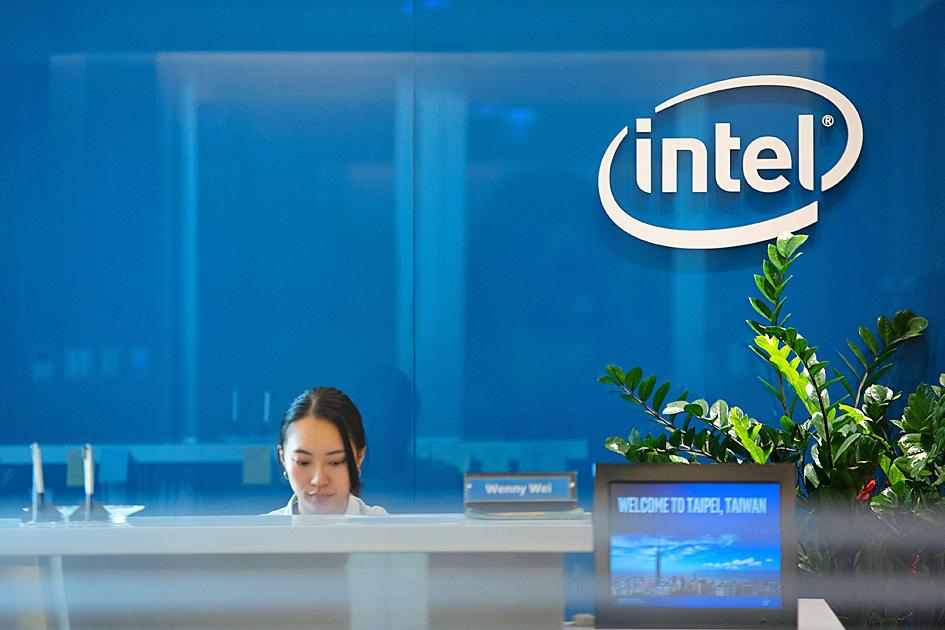Intel Corp has talked with Taiwan Semiconductor Manufacturing Co (TSMC, 台積電) and Samsung Electronics Co about the Asian companies making some of its best chips, but the Silicon Valley pioneer is still holding out hope for last-minute improvements in its own production capabilities.
After successive delays in its chip fabrication processes, Santa Clara, California-based Intel has yet to make a decision less than two weeks ahead of a scheduled announcement of its plans, people familiar with the deliberations said.
Any components that Intel might source from Taiwan would not come to market until 2023 at the earliest and would be based on established manufacturing processes already in use by other TSMC customers, said the people, asking not to be identified because the plans are private.

Photo: Ashley Pon, Bloomberg
Talks with Samsung, whose foundry capabilities trail TSMC’s, are at a more preliminary stage, the people said.
TSMC and Samsung representatives declined to comment, while an Intel spokesperson referred to previous comments by CEO Bob Swan, who has promised investors he would set out his plans for outsourcing and putting Intel’s production technology back on track when the company reports earnings on Thursday next week.
TSMC, the largest maker of semiconductors for other companies, is preparing to offer Intel chips manufactured using a 4-nanometer process, with initial testing using an older 5-nanometer process, the people said.
The company has said it would make test production of 4-nanometer chips available in the fourth quarter of this year and volume shipments the following year.
TSMC expects to have a new facility in Hsinchu County’s Baoshan Township (寶山) operational by the end of this year, which can be converted to production for Intel if required, one of the people said.
TSMC executives previously said the Baoshan unit would house a research center with 8,000 engineers.
Intel’s strategic shifts are happening at a time of booming demand, as well as technological change in the chip industry.
The traditional method of improving performance by shrinking and cramming more transistors into each package is being supplanted by more sophisticated techniques that include stacking processor and memory components into single chips and the introduction of more tailored designs for tasks like artificial intelligence.
Separately, United Microelectronics Corp (UMC, 聯電) on Saturday had power-supply disruptions at two plants in Hsinchu that temporarily affected production, UMC chief financial officer Liu Chi-tung (劉啟東) said.
“The company will discuss with customers, and try its best to make up for lost production,” Liu said by telephone. “No major financial impact is expected.”
The overall impact of the incident was “quite minor,” Liu said.
Power was being gradually restored, he said.

In Italy’s storied gold-making hubs, jewelers are reworking their designs to trim gold content as they race to blunt the effect of record prices and appeal to shoppers watching their budgets. Gold prices hit a record high on Thursday, surging near US$5,600 an ounce, more than double a year ago as geopolitical concerns and jitters over trade pushed investors toward the safe-haven asset. The rally is putting undue pressure on small artisans as they face mounting demands from customers, including international brands, to produce cheaper items, from signature pieces to wedding rings, according to interviews with four independent jewelers in Italy’s main

Macronix International Co (旺宏), the world’s biggest NOR flash memory supplier, yesterday said it would spend NT$22 billion (US$699.1 million) on capacity expansion this year to increase its production of mid-to-low-density memory chips as the world’s major memorychip suppliers are phasing out the market. The company said its planned capital expenditures are about 11 times higher than the NT$1.8 billion it spent on new facilities and equipment last year. A majority of this year’s outlay would be allocated to step up capacity of multi-level cell (MLC) NAND flash memory chips, which are used in embedded multimedia cards (eMMC), a managed

Japanese Prime Minister Sanae Takaichi has talked up the benefits of a weaker yen in a campaign speech, adopting a tone at odds with her finance ministry, which has refused to rule out any options to counter excessive foreign exchange volatility. Takaichi later softened her stance, saying she did not have a preference for the yen’s direction. “People say the weak yen is bad right now, but for export industries, it’s a major opportunity,” Takaichi said on Saturday at a rally for Liberal Democratic Party candidate Daishiro Yamagiwa in Kanagawa Prefecture ahead of a snap election on Sunday. “Whether it’s selling food or

In the wake of strong global demand for AI applications, Taiwan’s export-oriented economy accelerated with the composite index of economic indicators flashing the first “red” light in December for one year, indicating the economy is in booming mode, the National Development Council (NDC) said yesterday. Moreover, the index of leading indicators, which gauges the potential state of the economy over the next six months, also moved higher in December amid growing optimism over the outlook, the NDC said. In December, the index of economic indicators rose one point from a month earlier to 38, at the lower end of the “red” light.